

Religion: Selected Supreme Court Cases on Religion—Miller Center. Belmont PTA Decides Students Can Handle ‘Offensive’ Christmas Tree in ‘The Nutcracker’ - Massachusetts news. By Hannah Sparks Boston.com Staff November 22, 2014 2:19 PM A Belmont school’s field trip to see “The Nutcracker” is back on after what some may view as a battle between common sense and political correctness run amok.
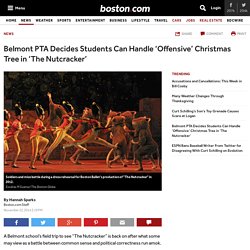
Earlier this week, the Butler Elementary School PTA cancelled the trip, a tradition at the school for years, because the ballet’s religious content might be offensive to some students. Most scarring, they believed, would be the Christmas tree gracing the stage—the stage a Christmas ballet was being performed on. After pushback from other parents, some of whom alleged that the PTA tried to keep the trip’s cancellation secret, the (voluntary) excursion is back on the schedule. Whew, that was close. Like many elements that have been incorporated into Christian holidays, the Christmas tree has pagan roots.
What we now consider the Christmas tree originated in Germany in the 16th century, but didn’t catch on in America until the 19th century. Judicial_%20Decision-Making_and_the_Constitution.pdf. 4th Amendment Landmark Cases. The 4th Amendment to the U.S.
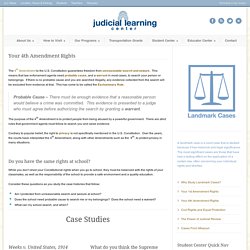
Constitution guarantees freedom from unreasonable search and seizure. This means that law enforcement agents need probable cause, and a warrant in most cases, to search your person or belongings. If there is no probable cause and you are searched illegally, any evidence collected from the search will be excluded from evidence at trial. This has come to be called the Exclusionary Rule. Probable Cause – There must be enough evidence that a reasonable person would believe a crime was committed. The purpose of the 4th Amendment is to protect people from being abused by a powerful government.
Contrary to popular belief, the right to privacy is not specifically mentioned in the U.S. Justice Teaching Lesson Plans Page. Supreme Court to Decide Whether Threats Made on Social Media Are Free Speech. WASHINGTON - The Supreme Court will consider the free speech rights of people who use violent or threatening language on Facebook and other electronic media where the speaker’s intent is not always clear.
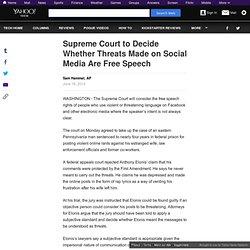
The court on Monday agreed to take up the case of an eastern Pennsylvania man sentenced to nearly four years in federal prison for posting violent online rants against his estranged wife, law enforcement officials and former co-workers. A federal appeals court rejected Anthony Elonis’ claim that his comments were protected by the First Amendment. He says he never meant to carry out the threats. He claims he was depressed and made the online posts in the form of rap lyrics as a way of venting his frustration after his wife left him.
At his trial, the jury was instructed that Elonis could be found guilty if an objective person could consider his posts to be threatening. Elonis’ estranged wife testified at his trial the postings made her fear for her life. Tennessee: Pregame prayer isn’t unconstitutional. Scotus_powers. Parents Object To Yoga Classes In Schools. The Right to Bear Arms. Texas school can force teenagers to wear locator chip: judge. SAN ANTONIO (Reuters) - A public school district in Texas can require students to wear locator chips when they are on school property, a federal judge ruled on Tuesday in a case raising technology-driven privacy concerns among liberal and conservative groups alike. U.S. District Judge Orlando Garcia said the San Antonio Northside School District had the right to expel sophomore Andrea Hernandez, 15, from a magnet school at Jay High School, because she refused to wear the device, which is required of all students.
The judge refused the student's request to block the district from removing her from the school while the case works its way through the federal courts. The American Civil Liberties Union is among the rights organizations to oppose the district's use of radio frequency identification, or RFID, technology. "We don't want to see this kind of intrusive surveillance infrastructure gain inroads into our culture," ACLU senior policy analyst Jay Stanley said. In shift, Tufts allows campus religious groups leeway in choosing leaders - Tufts - Your Campus. By Peter Schworm, Globe Staff Under a new policy, Tufts University will allow student religious groups to maintain religious requirements for its leaders, overturning a ruling that an evangelical Christian organization had violated the college’s nondiscrimination policy.
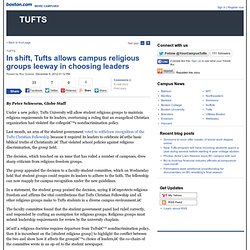
Last month, an arm of the student government voted to withdraw recognition of the Tufts Christian Fellowship because it required its leaders to celebrate “the basic biblical truths of Christianity.†That violated school policies against religious discrimination, the group held. The decision, which touched on an issue that has roiled a number of campuses, drew sharp criticism from religious freedom groups. Big cases await Supreme Court's 2012-13 term.
Affirmative action Fisher v.
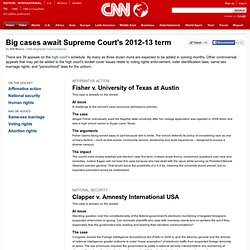
University of Texas at Austin This case is already on the docket. At issue A challenge to the school's race-conscious admissions policies. The case Abigail Fisher individually sued the flagship state university after her college application was rejected in 2008 when she was a high school senior in Sugar Land, Texas. The arguments Fisher claims being turned away in part because she is white. The impact The court's most closely watched pre-election case this term, it raises anew thorny, unresolved questions over race and remedies. Loving v. Virginia. A Multimedia Archive of the Supreme Court of the United States.